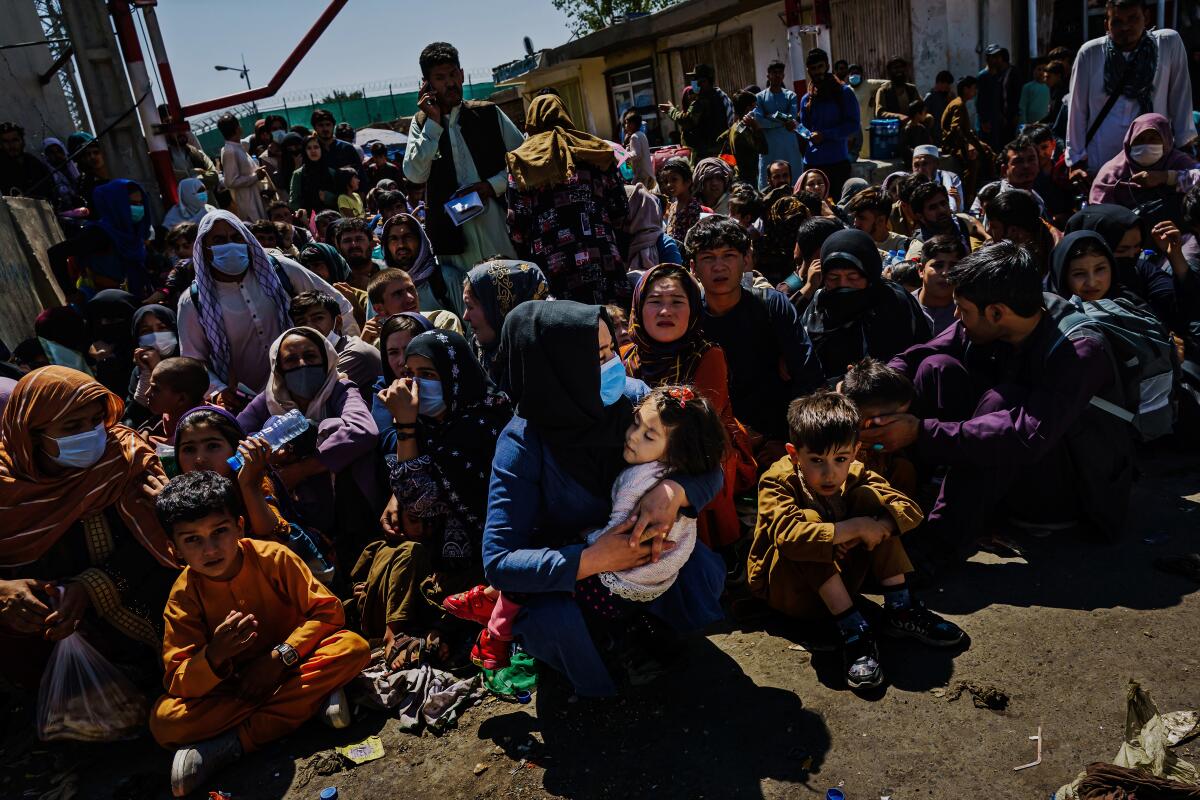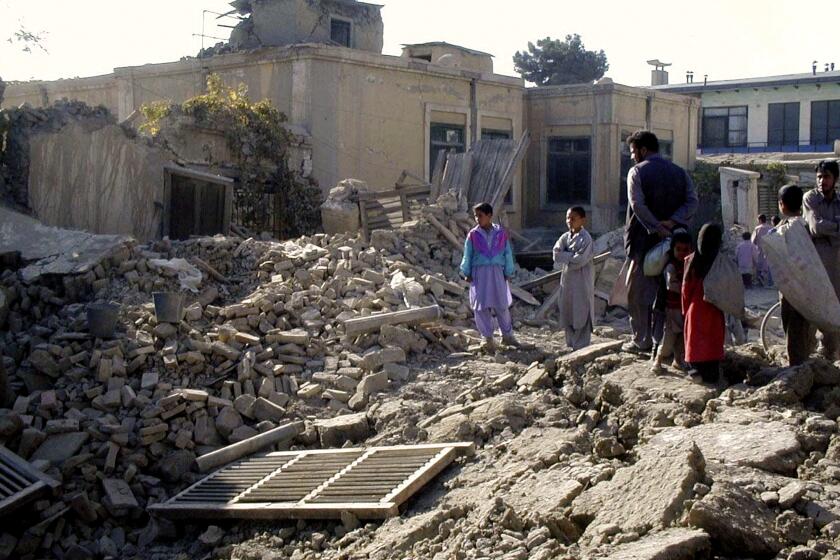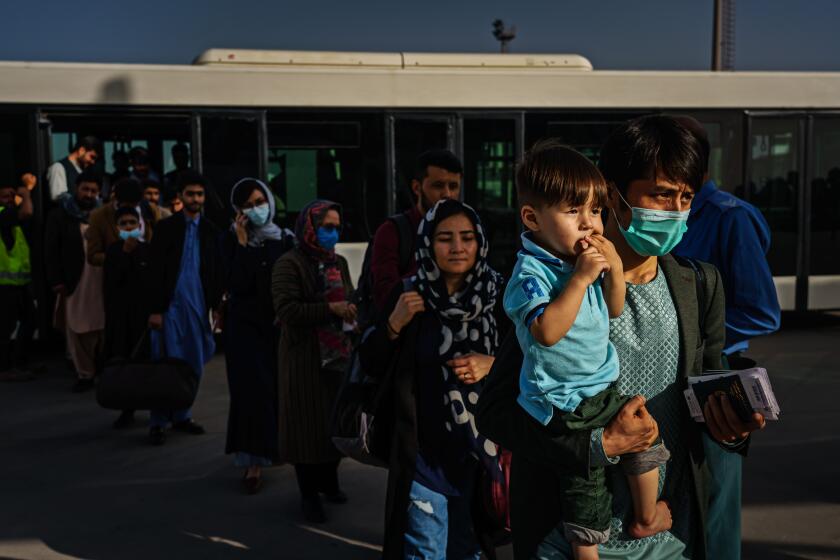Op-Ed: A U.S. program promising to help Afghans get out was a mirage. My family is still stuck

Next month marks one year since Kabul fell. On Aug. 15, 2021, after 20 years of occupation, the United States was withdrawing from Afghanistan as the Taliban encroached upon the capital.
Memories of past civil wars still haunted Kabul. Many of my relatives rushed to the Kabul airport hoping to make it out. Some waited days at checkpoints, amid massive crowds, but after a suicide bombing rocked the airport — at least 169 Afghans and 13 U.S. military personnel were killed in the chaos — the last planes flew out of Kabul without them. In West Sacramento, Calif., my family and I watched the news and called our relatives for updates, feeling helpless.
A few weeks later, I began to hear of a U.S. government program called “humanitarian parole.” Essentially, it was a special program that could grant temporary entry into the U.S. for “urgent humanitarian reasons.” Online, I read that Afghans qualified for humanitarian parole because of Kabul’s fall and a majority of Afghans had no other pathway out. The applications were expensive, $575 per person, but it seemed like a legitimate route into the U.S. My father, who immigrated to the U.S. in 1983, was less optimistic. “It’s a scam,” he said. “Only those with connections will get out.”
Despite war, warlords and the Taliban, my father and mother have remained in Kabul, while slowly all of their children have fled.
And yet I remained curious. Hopeful. I reached out to Afghan Americans who had experience working with refugees. They invited me to a WhatsApp group with other volunteers keeping up to date on the Afghan refugee crisis. At first, they too seemed hopeful.
Soon after, seeking humanitarian parole turned into a phenomenon in my community in West Sacramento. Our region has one of the largest Afghan communities in the U.S. Every Afghan I knew was filling out these applications for relatives or friends. They fundraised, organized information sessions and gathered evidence to prove applicants were targets of “serious harm.”
By September, Afghanistan’s economy was in a free-fall after the Biden administration had frozen roughly $7 billion in central bank assets to punish the Taliban. My relatives in Kabul and Logar, in eastern Afghanistan, began contacting me with greater urgency. My uncle in Kabul, who worked for the passport office and who hadn’t been paid in months by the former regime, offered me his life savings to act as his sponsor and to fill out applications for his family.
Over the next few weeks, I attended an information session organized by immigration lawyers; I printed out applications and gathered my uncle’s paperwork. I asked my siblings to free up an evening so we could fill out multiple applications at once. As humanitarian parole fever spread, even my cynical father gave in. He was receiving nonstop messages and calls from his relatives in Logar, and he wanted to see if we could help. I also had a beloved cousin who had escaped Afghanistan two years earlier and was living undocumented in Turkey. At 20, he was working 10-hour shifts in a factory in Istanbul, in perpetual fear that he might get caught and deported. I planned to fill out an application for him as well. We had about 20 relatives waiting on us.
And yet I held off. My father’s first warning echoed in my head. I wanted to be certain that this wasn’t another American scam.
I had a stack of applications partially filled out. I had photos of ID cards and passports. I had job descriptions and heartfelt pleas. But as I scrolled the messages in my humanitarian parole WhatsApp group, I realized that I hadn’t heard of a single acceptance. I held out hope because I hadn’t seen any rejections either, but by December, the volunteers in my WhatsApp group were getting worried. They shared reports of incredibly long response times, understaffed U.S. agencies and issues with third-party countries where some Afghans had fled.
The exemption will be applied on a case by case basis after security vetting and is expected to help Afghans who fled their country after U.S. troops withdrew and the Taliban took over last August, as well as some Afghans who entered the U.S. earlier.
Then, in January, the rejections started trickling in. As volunteers and lawyers tried to figure out why specific cases got rejected, it quickly became evident that all their cases — no matter how much evidence was submitted or how foolproof the case had seemed — were going to be denied.
Toward the end of February, I began to call my relatives and inform them that I wouldn’t be submitting their applications. “It was a scam,” I said in Pashto, echoing my father. My cousin in Istanbul still dodges police day and night. My relatives in Logar are all out of work. My uncle in Kabul took a severe pay cut at his passport office job and struggles to pay for medications and rent. Meanwhile, the Biden administration’s sanctions have devastated the economy, with few viable pathways for Afghans to leave.
By June, out of some 46,000 humanitarian parole applications from Afghans, the U.S. Citizenship and Immigration Services had approved only 297 while rejecting 4,246 — with the rest pending, according to CBS News. The federal agency recently expanded some eligibility requirements for humanitarian parole, but its website still says the U.S. is “prioritizing” parole applications for Afghans outside of Afghanistan (and can’t process requests for those who remain in the country since the American Embassy in Kabul is closed).
The situation remains dire. The Afghan American community has made efforts to assist refugees abroad and to raise funds for starving Afghans back home. My own family organized a food drive in May. But I often feel as if we are trying to put a bandage on a bullet wound. The other day, as my father and I were watching a news program on the food crisis in Afghanistan, he looked away from the screen and asked about the U.S.: “How much more are we supposed to suffer? How much longer will this country punish us?”
It’s a question I’m afraid to answer.
Jamil Jan Kochai is a Stegner fellow at Stanford and author of the recent short story collection “The Haunting of Hajji Hotak and Other Stories.” @jamiljankochai
More to Read
A cure for the common opinion
Get thought-provoking perspectives with our weekly newsletter.
You may occasionally receive promotional content from the Los Angeles Times.












